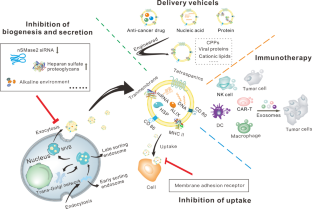Recent progress in exosome research: isolation, characterization and clinical applications

In recent breakthroughs, exosomes have emerged as pivotal players in cancer research, acting as nano-vesicles that facilitate intercellular communication through a diverse cargo of proteins, RNAs, DNAs, and lipids. In their review, Wang et al. outlined recent advancements in isolating and characterizing exosomes, examined their roles in controlling tumor spread, drug resistance, and immune responses in cancer development, and highlighted their potential applications in cancer therapy.
Cancer Diagnosis: Exosomes present a revolutionary approach to cancer diagnostics. Their nuanced cargo expressions in biological fluids provide a minimally invasive liquid biopsy method for precise cancer detection and prognostication.
Cancer Therapies: Beyond diagnostics, exosomes show significant promise in cancer treatment. Their inherent safety, biocompatibility, and low immunogenicity position them as potential catalysts in the development of effective and safe cancer therapies.
Cancer Research: Recent advancements in isolation and characterization techniques empower researchers to unravel the mysteries of exosomes. These tools enhance our understanding of these tiny messengers, opening new avenues for cancer research.
Cancer Dynamics: Exploring the biological functions of exosomes sheds light on their impact on tumor metastasis, drug resistance, and immune regulation. This knowledge is instrumental in developing targeted interventions for more effective cancer treatment.
In summary, exosomes are major players in cancer research, transforming both diagnosis and treatment. From precise liquid biopsies to innovative therapies, exosomes offer promise for a more advanced and effective approach to cancer care.